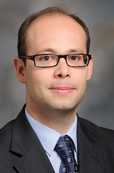24 Jul Genetic Syndrome Risk Elevated In Young Adults With Colon Cancer
 MedicalResearch.com Interview with:
MedicalResearch.com Interview with:
Eduardo Vilar-Sanchez, MD, PhD
Assistant Professor, Department of Clinical Cancer Prevention
Division of OVP, Cancer Prevention and Population Science
The University of Texas MD Anderson Cancer Center
Houston, TX 77030
Medical Research: What is the background for this study? What are the main findings?
Dr. Vilar-Sanchez: I am a physician scientist at The University of Texas MD Anderson Cancer Center (MDA), a medical oncologist specializing in cancer genetics, especially colorectal cancer (CRC) syndromes. At MD Anderson, I have medical practice consisting primarily of colorectal cancer, as part of the clinical cancer arm of MD Anderson.
I became interested in this topic because it is now well recognized that colorectal cancer is increasing in prevalence in young individuals. CRC is the third most common cancer in the US with 90% diagnosed in patients older than 50. While most CRC patients develop cancer in their 60s or 70s, the incidence is now rising in individuals younger than 50. Over the next two decades, it is projected that the incidence of CRC in young adults under 35 will double.
Only 5% of all CRC patients have a known hereditary predisposition cancer syndrome. Patients diagnosed at or under age 35 represent an extreme phenotypic presentation, constituting only 1.5% of all CRC cases.
We retrospectively reviewed all patients with CRC patients age 35 or under, who were evaluated by the Genetic Services group at MD Anderson. In this group, a surprising 30% had a recognized hereditary cancer syndrome, a marked increase compared to the general CRC population.
Medical Research: What were the most commonly identified hereditary cancer syndromes?
Dr. Vilar-Sanchez: Of the patients with a hereditary cancer syndrome, 1/3 had Lynch Syndrome and 1/3 had a familial polyposis syndrome.
Lynch syndrome or hereditary nonpolyposis colorectal cancer (HNPCC), increases the risk of colorectal cancer but also of many other types of cancer including endometrial (uterine) and ovarian in women. Several gene variations, including MLH1, MSH2, MSH6, PMS2, or EPCAM, predispose to Lynch syndrome. These genes are primarily involved in repairing mistakes made during DNA replication.
In Familial Polyposis Syndromes (FAP), pre-cancerous polyps develop in the rectum and large intestine beginning in the teenage years, eventually progressing to CRC at a younger than average age. Peutz–Jeghers syndrome is considered a form of FAP. The genes most commonly associated with FAP are APC and MUTYH.
MedicalResearch: Was there any difference in the cancer presentation between those patients with an identified genetic risk and the nonhereditary cancer patients?
Dr. Vilar-Sanchez: Yes, patients without a hereditary syndrome were most likely to be diagnosed with a left-sided tumor, metastatic disease and poorly differentiated cancer. Hereditary syndrome patients were more likely to have a family history of cancer and a personal history of another type of cancer. We speculate that some patients with a family history were undergoing cancer surveillance leading to an earlier diagnosis; however several patients with a known family history of Lynch Syndrome or FAP were not undertaking any surveillance measures.
MedicalResearch: What should clinicians and patients take away from this report?
Dr. Vilar-Sanchez: For clinicians, our work supports genetic counseling for all patients diagnosed with colorectal cancer at 35 or younger to evaluate risk for both Lynch Syndrome and FAP. Patients found to have recognized predisposition can be encouraged by their clinicians to adopt a health lifestyle and to follow through with cancer surveillance measures.
Knowledge of a genetic risk empowers the patient to focus their health care attention in a meaningful way, through education of themselves and their extended family of the need for ongoing cancer detection and lifestyle modifications that may reduce their overall cancer risk.
MedicalResearch: What further research are you planning as a result of this work?
Dr. Vilar-Sanchez: Going forward, our group would like to focus on the 2/3 of young colon cancer patients without an identified genetic cause. Since about 75% of patients in this group had a family history of colon or other cancer, a hereditary contribution to their disease is possible if not likely.
We would also like to explore several behavioral and environmental factors, including diet, obesity, smoking and alcohol that may contribute to colon cancer risk, with or without a genetic component.
Citation:
JCO published online on July 20, 2015; DOI:10.1200/JCO.2015.61.4503.
[wysija_form id=”3″]
Eduardo Vilar-Sanchez, MD, PhD (2015). Genetic Syndrome Risk Elevated In Young Adults With Colon Cancer
Last Updated on July 24, 2015 by Marie Benz MD FAAD
